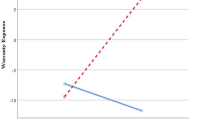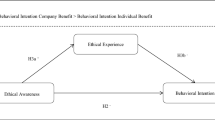Abstract
This research applies the theory of planned behavior to corporate managers’ decision making as it relates to fraudulent financial reporting. Specifically, we conducted two studies to examine the effects of attitude, subjective norm and perceived control on managers’ decisions to violate generally accepted accounting principles (GAAP) in order to meet an earnings target and receive an annual bonus. The results suggest that the theory of planned behavior predicts whether managers’ decisions are ethical or unethical. These findings are relevant to corporate leaders who seek to improve ethical work climates of organizations and to many regulators, accountants, corporate governance officials and investors.
Similar content being viewed by others
References
InstitutionalAuthorNameAmerican Institute of Certified Public Accountants (AICPA) (2002) ‘Consideration of Fraud in a Financial Statement Audit’ AICPA New York, NY
American Institute of Certified Public Accountants (AICPA): 2003, ‘Professional Ethics’, http://aicpa.org.
W. S. Albrecht M. B. Romney (1986) ArticleTitle‘Red-Flagging Management Fraud: A Validation’ Advances in Accounting 3 323–333
I. Ajzen (1985) ‘From Intentions to Actions: A Theory of Planned Behavior’ J. Kuhland J. Beckman (Eds) Action-Control: From Cognitions to Behavior Springer Heldeberg 11–39
I. Ajzen (1991) ArticleTitle‘The Theory of Planned Behavior’ Organizational Behavior & Human Decision Processes 50 179–211
I. Ajzen M. Fishbein (1980) Understanding Attitudes and Predicting Social Behavior Prentice-Hall Upper Saddle River, NJ
I. Ajzen T. J. Madden (1986) ArticleTitle‘Prediction of Goal Directed Behavior: Attitudes, Intentions, and Perceived Behavioral Control’ Journal of Experimental Social Psychology 22 453–474 Occurrence Handle10.1016/0022-1031(86)90045-4
Association of Certified Fraud Examiners: 2002, ‘Report␣to the Nation’, http://marketplace.cfcnet.com/ downloads.asp.
T. B. Bell J. V. Carcello (2000) ArticleTitle‘A Decision Aid for Assessing the Likelihood of Fraudulent Financial Reporting’ Auditing: A Journal of Practice and Theory 19 169–184
Bruns, W. J. and K. A. Merchant: 1990, ‘The Dangerous Morality of Managing Earnings’, Management Accounting, 22–25.
Burns, J.: 2002, February 20, ‘SEC Fields Tips Linked to Fraud at Record Pace’, Wall Street Journal, B.5.N.
M. K. Chang (1998) ArticleTitle‘Predicting Unethical Behavior: A Comparison of the Theory of Reasoned Action and the Theory of Planned Behavior’ Journal of Business Ethics 17 1825–1834 Occurrence Handle10.1023/A:1005721401993
M. Cordano I. H. Frieze (2000) ArticleTitle‘Pollution Reduction Preferences of U.S. Environmental Managers: Applying Ajzen’s Theory of Planned Behavior’ Academy of Management Journal 43 627–641
A. J. Dubinsky T. N. Ingram (1984) ArticleTitle‘Correlates of Salespeople’s Ethical Conflict: An Exploratory Investigation’ Journal of Business Ethics 3 343–353 Occurrence Handle10.1007/BF00381759
R. A. Dye (1988) ArticleTitle‘Earnings Management in an Overlapping Generations Model’ Journal of Accounting Research 26 IssueID2 195–235
M. Fishbein I. Ajzen (1975) Belief, Attitude, Intention, and Behavior: An Introduction to Theory and Research Addison Wesley Reading, MA
B. L. Flannery D. R. May (2000) ArticleTitle‘Environmental Ethical Decision Making in the U.S. Metal Finishing Industry’ Academy of Management 43 642–662
S. H. Glover M. A. Bumpus G. F. Sharp G. A. Munchus (2002) ArticleTitle‘Gender Differences in Ethical Management’ Women in Management Review 17 217–227 Occurrence Handle10.1108/09649420210433175
S. E. Kaplan (2001a) ArticleTitle‘Further Evidence on the Ethics of Managing Earnings: An Examination of the Ethically Related Judgments of Shareholders and Non-Shareholders’ Journal of Accounting and Public Policy 20 27–44 Occurrence Handle10.1016/S0278-4254(01)00017-5
S. E. Kaplan (2001) ArticleTitle‘Ethically related judgments of observers of earnings management’ Journal of Business Ethics 32 285–298 Occurrence Handle10.1023/A:1010600802029
J. M. Larkin (2000) ArticleTitle‘The Ability of Internal Auditors to Identify Ethical Dilemmas’ Journal of Business Ethics 23 401–409 Occurrence Handle10.1023/A:1006150718834
J. K. Loebbecke M. M. Eining J. J. Willingham (1989) ArticleTitle‘Auditors’ Experience with Material Irregularities: Frequency, Nature and Detectability’ Auditing: A Journal of Practice and Theory 8 1–28
J. M. Lozano (1996) ArticleTitle‘Ethics and Management: A Controversial Issue’ Journal of Business Ethics 15 227–237 Occurrence Handle10.1007/BF00705590
T. J. Madden P. S. Ellen I. Ajzen (1992) ArticleTitle‘A Comparison of the Theory of Planned Behavior and the Theory of Reasoned Action’ Personality and Social Psychology Bulletin 18 3–9
A. L. Minkes M. W. Small S. R. Chaterjee (1999) ArticleTitle‘Leadership and Business Ethics: Does it Matter? Implications for Management’ Journal of Business Ethics 20 327–335 Occurrence Handle10.1023/A:1005741524800
Nieschwietz, R., J. Schultz, and M. Zimbelman: 2000, ‘Empirical Research on External Auditors’ Detection of Financial Statement Fraud’, Journal of Accounting Literature, 190–246.
Z.-V. Palmrose (1987) ArticleTitle‘Litigation and Independent Auditors: The Role of Business Failures and Management Fraud’ Auditing: A Journal of Practice and Theory 6 90–103
InstitutionalAuthorNamePublic Oversight Board (2000) The Panel on Audit Effectiveness: Report and Recommendations Stamford CT
Pulliam, S.: 2003, ‘Over the Line: A Staffer Ordered to Commit Fraud Balked, then Caved Pushed by WorldCom Bosses, Accountant Betty Vinson Helped Cook the Books – a Confession at the Marriott’, Wall Street Journal, A1.
D. M. Randall A. M. Gibson (1991) ArticleTitle‘Ethical Decision Making in the Medical Profession: An Application of the Theory of Planned Behavior’ Journal of Business Ethics 10 111–122 Occurrence Handle10.1007/BF00383614
Reinstein, A. and G. Coursen: 1999, ‘Considering the Risk of Fraud: Understanding the Auditor’s New Requirements’, The National Public Accountant, 34–38.
R. R. Rosenburg (1984) ArticleTitle‘Managerial Morality and Behavior: The Questionable Payment Issue’ Journal of Business Ethics 6 23–36 Occurrence Handle10.1007/BF00382945
Rosenzweig, K. and M. Fischer: 1994, ‘Is Managing Earnings Ethically Acceptable?’ Management Accounting, 31–34.
D. Ruegger E. W. King (1992) ArticleTitle‘A Study of the Effect of Age and Gender upon Student Business Ethics’ Journal of Business Ethics 11 179–186 Occurrence Handle10.1007/BF00871965
Securities and Exchange Commission (SEC): 2003, ‘Final Rule: Disclosure Required by Sections 406 and 407 of the Sarbanes-Oxley Act of 2002’, http://sec.gov.
B. H. Sheppard J. Hartwick P. R. Warshaw (1988) ArticleTitle‘The Theory of Reasoned Action: A Meta-Analysis of Research and Recommendations for Modifications to Future Research’ Journal of Consumer Research 15 32–43 Occurrence Handle10.1086/209170
Tatum, K. et al. (American Accounting Association Auditing Standards Committee): 2000, ‘Fraud: A Review of Academic Literature’, Auditors Report24(2).
InstitutionalAuthorNameTreadway Commission (1999) ‘Fraudulent Financial Reporting: 1987–1997, An Analysis of U.S. Public Companies’ Committee of Sponsoring Organizations of the Treadway Commission New York
J. Wahn (2003) ArticleTitle‘Sex Differences in Competitive and Compliant Unethical Work Behavior’ Journal of Business and Psychology 18 121–127 Occurrence Handle10.1023/A:1025039105839
Author information
Authors and Affiliations
Corresponding author
Rights and permissions
About this article
Cite this article
Carpenter, T.D., Reimers, J.L. Unethical and Fraudulent Financial Reporting: Applying the Theory of Planned Behavior. J Bus Ethics 60, 115–129 (2005). https://doi.org/10.1007/s10551-004-7370-9
Issue Date:
DOI: https://doi.org/10.1007/s10551-004-7370-9




